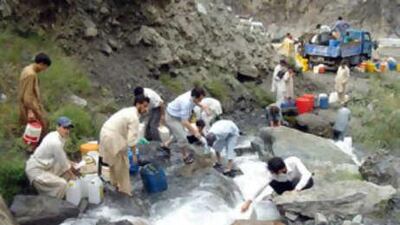ISLAMABAD // Overwhelmed by the flooding, Pakistan's politicians and officials are blaming each other for the government's poor response. In the two weeks since storms triggered the floods, victims have complained about the lack of adequate warning, the absence of administrators, and the failure of most politicians to join relief efforts.
Across Khyber Pakhtunkhwa province, most of which has been declared a calamity zone, victims said they had not seen government representatives or received any assistance before August 5, eight days after the floods. Khyber-Pakhtunkhwa residents have felt particularly betrayed by the Awami National Party, a Pashtun nationalist party that leads the province's government. Mohammed Yasin, a 27-year-old transporter from the district of Charsadda, described the absentee politicians and administrators as "people who are dead from the inside".
However, the party's politicians have told constituents the provincial government lacks the resources to tackle the disaster and advised them to await international assistance. Residents in the Swat valley said they had pleaded with provincial ministers to undertake essential projects, particularly the construction of temporary footbridges to reconnect stranded communities, but to no avail. The Khyber-Paktunkhwa government has said repeated pleas to the federal government have been ignored.
Mian Iftikhar Hussain, the provincial minister for information, told journalists in Peshawar on Tuesday that Islamabad had failed to respond to pleas for help and, instead, the National Disaster Management Authority (NDMA) had diverted resources to Punjab and Sindh provinces. He said the province's "people have been lauded when they sacrificed their lives in the fight against terrorism, but are now being ignored".
United Nations sources said that behind-the-scenes feuding between the Khyber-Pakhtunkhwa government and the NDMA had affected the collection of damage data. "There is a serious communication gap, and the figures we have been provided by the two branches of government are contradictory," said a UN source, speaking on condition of anonymity. The NDMA has also been feuding with the Pakistan Meteorological Department, accusing it of failing to provide it with adequate warning of the storms. The weathermen responded with reproduced forecasts dating back to early July warning of abnormally heavy rains.
The federal government also has been under fire from the government of central Punjab province, where millions of residents have been displaced since July 31. The province's chief minister, Shahbaz Sharif, younger brother of the national opposition leader Nawaz Sharif, has verbally sparred with federal ministers over Islamabad's refusal to provide emergency financial support until a proper assessment of damages - a task the prime minister, Yousaf Raza Gilani, has repeatedly said would be carried out by the World Bank and Asian Development to ensure transparency.
Until then, the federal government has told the provinces to draw on their own funds. The governments are flush with cash received from Islamabad for the financial year that started on July 1. The brunt of criticism has been borne by Asif Ali Zardari, Pakistan's president, who has been vilified for continuing his visits to France and Britain as the flooding got worse. Mr Zardari, who returned to Pakistan on Monday, has yet to address the Pakistani public. His only response so far came in an article in the Wall Street Journal yesterday.
"I might have benefited personally from the political symbolism of being in the country at the time of natural disaster. But hungry people can't eat symbols. The situation demanded action, and I acted to mobilise the world," he wrote. The failures of Pakistan's governments have contrasted with a massive mobilisation of Pakistan's military. Gen Pervez Ashaq Kayani, the army chief, has toured affected areas since the onset of the floods on July 29.
"The political fallout from the floods is threatening a weak government and fragile civil-military balance," said Jayshree Bajoria of the Council on Foreign Relations in a report published on Tuesday. @Email:thussain@thenational.ae * With additional reporting by Usman Ali from Mingora

